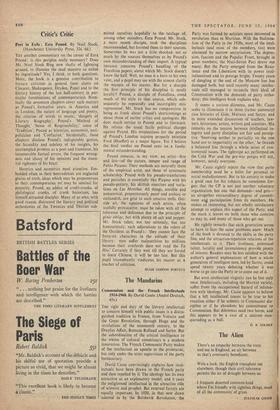Critic's Critic
Poet in Exile : Ezra Pound. By Noel Stock. (Manchester University Press, 32s. 6d.) YET another commentary on the career of Ezra Pound: is this periplus really necessary? Does Mr. Noel Stock fling new shafts of lightning around, to illumine the mad maestro so exiled by ingratitude? Yes, I think, to both questions. More, the book is a genuine contribution to literary criticism in general (new slants on Chaucer, Shakespeare, Dryden, Pope) and to the literary history of the last half-century in par- ticular (revaluations of contemporaries). Nom- inally the seventeen chapters cover such matters as Pound's formative years, in America and in London; the nature of language and poetry, the relation of words to music; 'dangers of Literary Biography'; Pound's 'Method of Thought,' 'Sense of Responsibility,' sense of `Tradition'; Pound as historian, economist, anti- politician and `Confucian.' Incidentally, these chapters disclose Pound's indisputable genius, the fecundity and subtlety of his insights, his unexampled prowess as a poet and translator, his innumerable factual errors, the frequent wrong- ness and idiocy of his opinions and the essen- tial rightness of his heart.
Heretics and eccentrics need attention. Em- bedded often in their heterodoxies are neglected grains of truth, ideas which may be preposterous to their contemporaries yet may be seminal for posterity. Pound, an addict of credit-cranks, of philological cranks, of crank historians, has himself attracted disciples. Many of us who, with good reason, distrusted the literary and political orthodoxies of the Twenties and Thirties sub-
mitted ourselves hopefully to the• tutelage of, among other outsiders, Ezra Pound. Mr. Stock, a more recent disciple, took the disciplines recommended, but ferreted them to their sources. Sometimes he was not a little shocked, not so much by the sources themselves as by Pound's own misunderstanding of their import. A typical instance concerns Pound's handling of the Fenollosa papers, about which Mr. Stock doesn't know the half. Well, no man is a hero to his own valet, and a pupil may see with the utmost clarity the myopia of his master. But for a disciple the first principle of his discipline is surely loyalty? Pound, a disciple of Fenollosa, owed much of his style to that source, which sub- sequently he repeatedly and incorrigibly mis- represented. Mr. Stock has no compunction in being as frank about Pound's shortcomings as about those of earlier critics and apologists. He does much service to Pound and to literature. He refutes the usual facile political charges against Pound. His revaluations for the period of Pound's London sojourn properly reinstate Ford (Hueffer) as a major figure. Yet I believe the final verdict on Pound rests on a funda- mental misunderstanding.
Pound remains, in my view, an artist—first and last—of the stature, temper and range of Pablo Picasso. Their methods are naturally those of the empirical artist, not those of systematic scholarship. Pound with his pseudo-translations and pastiches is essentially like Picasso with his pseudo-pottery, his skittish exercises and varia- tions on Las Meniiias. All things, sensible and nonsensical, preposterously passé and archaic or outlandish, are grist to such creative mills. Out- side art, the opinions of such artists, often usefully provocative, must be taken with all the tolerance and deference due to the principle of genie oblige, but with plenty of salt and pepper. Mr. Stock takes, not too seriously, but too humourlessly, such adjurations to the rulers of the Occident as Pound's: 'they cannot face the forty-six characters in the solitude of their library: men suffer malnutrition by millions because their overlords dare not read the Ta Lilo.' Certainly if they wait till they are forced to learn Chinese, it will be too late. But this pupil triumphantly vindicates his master as a teacher of criticism.
HUGH GORDON PORTEUS


































 Previous page
Previous page